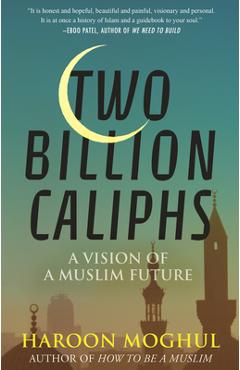Two Billion Caliphs: A Vision of a Muslim Future - Haroon Moghul

Detalii Two Billion Caliphs: A Vision
Two Billion Caliphs: A Vision - Disponibil la libris.ro
Pe YEO găsești Two Billion Caliphs: A Vision de la Haroon Moghul, în categoria Religion.
Indiferent de nevoile tale, Two Billion Caliphs: A Vision of a Muslim Future - Haroon Moghul din categoria Religion îți poate aduce un echilibru perfect între calitate și preț, cu avantaje practice și moderne.
Preț: 97.79 Lei
Caracteristicile produsului Two Billion Caliphs: A Vision
Comandă Two Billion Caliphs: A Vision Online, Simplu și Rapid
Prin intermediul platformei YEO, poți comanda Two Billion Caliphs: A Vision de la libris.ro rapid și în siguranță. Bucură-te de o experiență de cumpărături online optimizată și descoperă cele mai bune oferte actualizate constant.
Descriere magazin:
Explains the attraction of Muslims to their faith, and discusses the challenges contemporary Islam confronts, and how we might imagine an Islamic theology and identity ready to face tomorrow Islam is often associated with and limited to the worst of the world--extremism, obscurantism, misogyny, bigotry. So why would so many people associate with such a fundamentalist faith? Two Billion Caliphs advocates for a way of being Muslim in the world, ready for today and prepared for tomorrow. Unlike stale summaries, which restrict themselves to facts and figures, Haroon Moghul presents a deeply Muslim perspective on the world, providing Islamic answers to universal questions: Who are we? What are we doing here? What happens to us when we die? And from description, Moghul moves to prescription, aspiring to something outrageous and audacious. Two Billion Caliphs describes what Islam has been and what it is, who its heroes are, what its big ideas are, but not only to tell you about the past or the present, but to speak to the future. Two Billion Caliphs finds that Islam was a religion of intimacy, a faith rooted in and reaching for love, and that it could be and should be again. Fulfilling that destiny depends on the efforts of Muslims to reclaim their faith, rebuild their strength, and reimagine their future, on their own terms. Two Billion Caliphs offers Muslim thoughts for the age ahead, to create an interpretation Islam of and for days to come, the kind of religion the world\'s Muslims deserve, with echoes of the confident faith Muslims once had. The destiny of Islam, then, is not, as so many prefer to argue, a reformation. It is a counter-reformation. A restoration of what once was.

Produse asemănătoare

Two Billion Caliphs. A Vision of a Muslim Future, Hardback/Haroon Moghul
![]() elefant.ro
elefant.ro
Actualizat in 27/10/2025
165.99 Lei
Produse marca Haroon Moghul

Two Billion Caliphs: A Vision of a Muslim Future - Haroon Moghul
![]() libris.ro
libris.ro
Actualizat in 11/04/2024
97.79 Lei